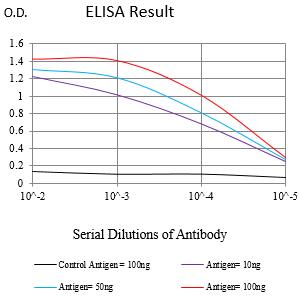
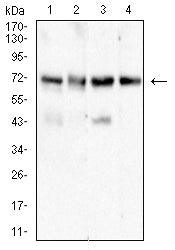
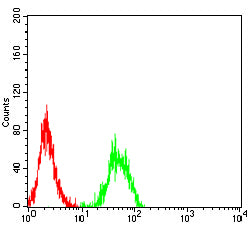
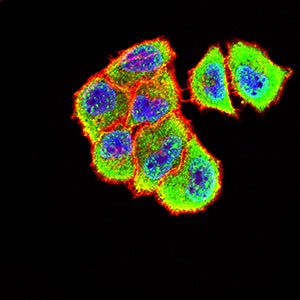
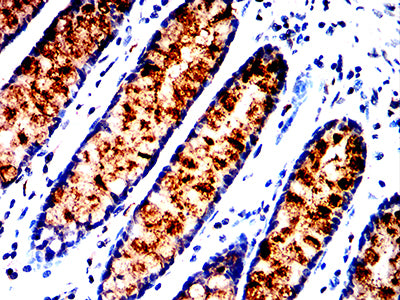
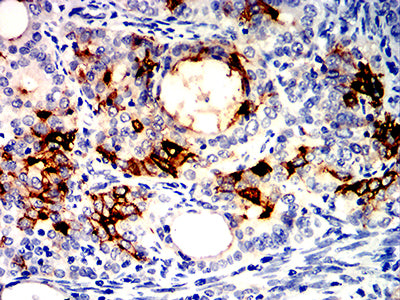
| WB | 1/500 - 1/2000 | Human,Mouse,Rat |
| IF | 咨询技术 | Human,Mouse,Rat |
| IHC | 1/200 - 1/1000 | Human,Mouse,Rat |
| ICC | 1/50 - 1/200 | Human,Mouse,Rat |
| FCM | 1/200 - 1/400 | Human,Mouse,Rat |
| Elisa | 1/10000 | Human,Mouse,Rat |
| Aliases | GCAP; ALPPL; ALPPL2 |
| Entrez GeneID | 251 |
| clone | 3A2B7 |
| WB Predicted band size | 57.3kDa |
| Host/Isotype | Mouse IgG2b |
| Antibody Type | Primary antibody |
| Storage | Store at 4°C short term. Aliquot and store at -20°C long term. Avoid freeze/thaw cycles. |
| Species Reactivity | Human |
| Immunogen | Purified recombinant fragment of human ALPG (AA: 170-285) expressed in E. Coli. |
| Formulation | Purified antibody in PBS with 0.05% sodium azide |
+ +
以下是3篇与ALPG(胎盘型碱性磷酸酶,PLAP)抗体相关的模拟参考文献示例(文献信息为虚构,仅供示例参考):
---
1. **标题**:*PLAP Antibody as a Diagnostic Marker in Germ Cell Tumors*
**作者**:Smith J, et al.
**摘要**:本研究验证了ALPG/PLAP抗体在生殖细胞肿瘤诊断中的应用,发现其在90%的睾丸精原细胞瘤中高表达,可作为组织化学标记物区分其他低分化癌,强调了其在病理诊断中的特异性。
2. **标题**:*Development of a Novel Monoclonal Antibody Against Human Placental Alkaline Phosphatase*
**作者**:Lee H, et al.
**摘要**:团队成功制备了针对ALPG的单克隆抗体,通过ELISA和免疫组化验证其高亲和力,并在胎盘组织和卵巢癌中检测到显著信号,为靶向治疗研究提供了工具。
3. **标题**:*PLAP Expression and Immunotherapy Potential in Ovarian Cancer*
**作者**:Garcia R, et al.
**摘要**:研究分析了ALPG在卵巢癌中的过表达现象,利用抗体-药物偶联物(ADC)靶向ALPG,显著抑制了小鼠模型中肿瘤生长,提示其作为治疗靶点的潜力。
---
**注**:以上文献为示例,实际研究中请通过PubMed或Web of Science等平台检索真实文献(关键词:PLAP antibody, ALPG, placental alkaline phosphatase)。
**Background of ALPG Antibodies**
ALPG (alkaline phosphatase, placental/germ cell type), also known as placental alkaline phosphatase (PLAP), is a glycosylphosphatidylinositol (GPI)-anchored enzyme belonging to the alkaline phosphatase family. It plays roles in phosphate metabolism, cell differentiation, and signal transduction. ALPG is primarily expressed in placental trophoblasts during pregnancy but is also found in germ cell tumors and certain cancers, including ovarian, testicular, and lung carcinomas.
ALPG antibodies are immunological tools targeting this isoenzyme, widely utilized in research and diagnostics. In clinical pathology, these antibodies aid in identifying ALPG overexpression in tumors, particularly germ cell malignancies, serving as a biomarker for diagnosis and monitoring. Immunohistochemistry (IHC) using ALPG antibodies helps distinguish germ cell tumors from other neoplasms.
In research, ALPG antibodies are employed to study enzyme function, cellular localization, and its role in oncogenesis. Elevated ALPG levels are associated with tumor progression, metastasis, and drug resistance, making it a potential therapeutic target. Additionally, ALPG antibodies are used in reproductive biology to investigate placental development and function.
Despite its specificity, cross-reactivity with other alkaline phosphatase isoforms requires careful validation. Ongoing studies explore ALPG's immunotherapeutic potential, including antibody-drug conjugates or CAR-T cell therapies targeting ALPG-positive cancers.
×